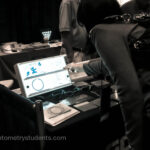Starting with a Massachusetts State House Visit for a Children’s Vision Advocacy Day and ending with working on statistical analysis for an upcoming ARVO abstract, a week in the life as an OD/MS student at NECO can encompass a wide range of experiences! Although hectic at times, due to extra classes and the time commitment of running subjects, my experience as a dual OD/MS degree seeking student has been worth every bit of the extra work. Even though each lab and individual MS project is different, I think each dual degree student can agree that our experiences have made us better clinicians and better  researchers. As another OD/MS student from NECO, Ran He says, “Being a part of the MS program has allowed me to apply my clinical skills to real-life research and further expand my knowledge base in the field of vision. There is always something to be explored or a question to be answered.”
researchers. As another OD/MS student from NECO, Ran He says, “Being a part of the MS program has allowed me to apply my clinical skills to real-life research and further expand my knowledge base in the field of vision. There is always something to be explored or a question to be answered.”
At NECO, students have been granted a wonderful opportunity to pursue their interests in research in conjunction with the regular OD degree through the dual OD/MS program. Students in the MS program still graduate in the standard four years upon completion of extra classes, the research project and the student’s thesis defense. Research related degrees are not only offered at NECO but also at 11 other schools and colleges of optometry. For a full listing of these check out the ASCO’s (Association of Schools and Colleges of Optometry) listing of graduate programs for an overview and listing of contacts.
As a dual degree student, I have been fortunate to have been paired with an amazing mentor and clinician, Dr. Bruce Moore, O.D. With his help, I’ve been able to work on a variety of projects related to pediatric vision, vision screening and vision in the developing world. Additionally, I’ve had the privilege to collaborate with other leading institutions and people outside the small optometric community such as MIT, Harvard Ophthalmology, Oxford University UK and Hadassah Academic College, Israel. I’m grateful for all these opportunities that may not have been possible without the benefits afforded me by the dual degree program.
Dual degree programs and graduate degrees earned in addition to the OD degree help bridge the gap between the scientific and the clinical aspects of optometry. Targeting this gap is  crucial to producing answers and solutions to questions and problems that many clinicians and patients have. Participating in research has made me a better and more questioning clinician and has enabled me to collaborate outside the sometimes small world of optometry. In turn, I’ve
crucial to producing answers and solutions to questions and problems that many clinicians and patients have. Participating in research has made me a better and more questioning clinician and has enabled me to collaborate outside the sometimes small world of optometry. In turn, I’ve
built contacts and exchanged ideas among leaders in the field of vision research. Even though the dual degree program at NECO is the way I personally pursued research, it isn’t the only way to get involved. Other opportunities exist and I challenge all those pre-optometry and optometry students out there to get involved and try some research for yourself! All it takes are great ideas, questions, a drive to learn more about vision and a desire to ultimately improve the lives of our patients.

